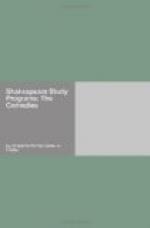Anne and her father and mother as characterized in this act, with relation to the suitors.
QUERIES FOR DISCUSSION
Is Anne the only character one can thoroughly sympathize with?
Are the situations such as owe their fun largely to coincidence, like those in the “Comedie of Errors,” or to a teeming variousness in the human naturalness of all the characters?
THE STORY OF ACT IV
FORD’S ENLIGHTENMENT
Why is the Old Woman of Brentford trick a climax upon that of the Buckbasket?
Falstaffe’s wish that all the world might be cheated is true to the method of the Play. Show in exemplification of this, how a fourth intrigue grows out of the third, and is introduced as late as this fourth Act. How is the joke of the Host against Dr. Caius and Sir Hugh Evans avenged? Is this reference to the “three Cozen Jermans” that are said to run away with the Host’s horses, liklier to be an allusion seriously made to a real event or to make use of it as an entirely fictitious intrigue and practical joke in the Play? Is this mock happening such as could be clear by the method of enacting it and one entirely consonant with this Comedy as a farce-mosaic of laughable tricks? (See pp. 120-121, 179-180, also Note on IV. iii. 6). Discuss probabilities. The turn taken in the plot: Show how all combine against Falstaffe; also the place of this intrigue in making material for Act V.
QUERIES FOR DISCUSSION
Has the “Merry Wives” any serious or tragic moments such as belong usually to Shakespeare’s Comedies?
Compare the jealousy of Ford with the jealousy of Adriana in the “Comedie of Errors.” Which exemplifies the riper treatment and why?
THE STORY OF ACT V
THE DEFEAT OF MERCENARY LOVEMAKING
Make clear the ins and outs of the Fairy trap, first for its actors, then for the dupes? Can the apparent inconsistencies in the wearing of green or white and the mention of “Quickly” for “Queene” be accounted for on the supposition that everybody is deceived except Nan and Fenton? (See Notes on V. v. 421, 205-209).
The compliments to Queen Elizabeth in the Play: What are they and how is their appropriateness to the Plot made good?
Consider the “humors” of the Welsh and French speeches and episodes as exploitations and developments of the similar humors of Fluellen and the Frenchmen of “Henry V.”
The fairy scenes and effects of this Play compared with those of the wedding night feast at the end of “A Midsommer Nights Dreame.”
What indications are there in the Falstaffe of “Henry IV.” that he is superficially affected by the Puritanism about him? Is he any more deeply affected by it in the present Play? What is the difference in his appearance in this Play with respect to Puritanic morals: Is he more affected by them, at the last, when he is so grossly their victim, or have they grown, and put him out of date in England except as an atavism?




